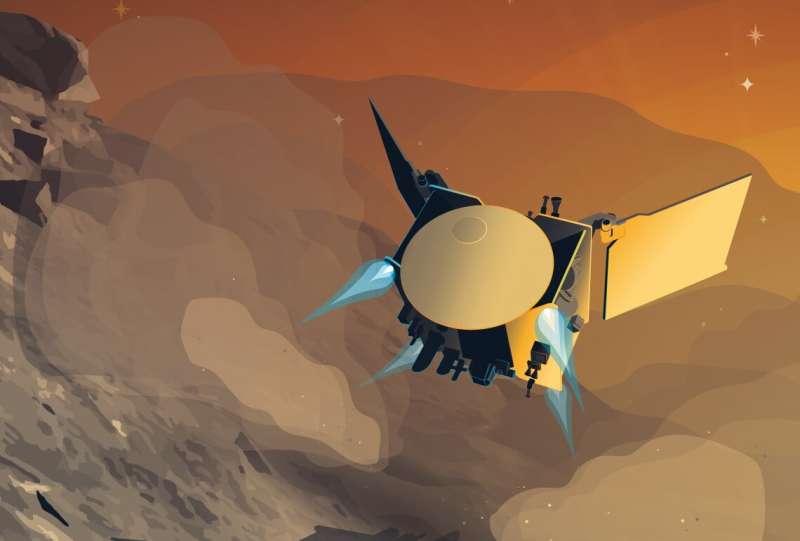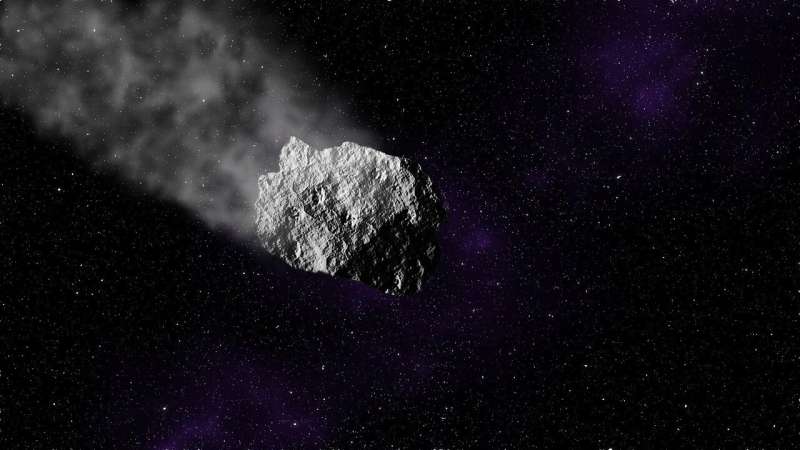
Copernical Team
Carbon dioxide glaciers are moving at the Martian south pole
 Glaciers of carbon dioxide are moving, creating deposits kilometers thick today across the south polar region of Mars, something that could have been going on more than 600,000 years, a paper by Planetary Science Institute Research Scientist Isaac Smith says.
"The CO2 deposits that were first identified in 2011 turn out to be flowing today, just like glaciers on Earth," said Smith, lead au
Glaciers of carbon dioxide are moving, creating deposits kilometers thick today across the south polar region of Mars, something that could have been going on more than 600,000 years, a paper by Planetary Science Institute Research Scientist Isaac Smith says.
"The CO2 deposits that were first identified in 2011 turn out to be flowing today, just like glaciers on Earth," said Smith, lead au Microrobot collectives display versatile movement patterns
 Researchers at the Max Planck Institute for Intelligent Systems (MPI-IS), Cornell University and Shanghai Jiao Tong University have developed collectives of microrobots which can move in any desired formation. The miniature particles are capable of reconfiguring their swarm behavior quickly and robustly. Floating on the surface of water, the versatile microrobotic discs can go round in circles,
Researchers at the Max Planck Institute for Intelligent Systems (MPI-IS), Cornell University and Shanghai Jiao Tong University have developed collectives of microrobots which can move in any desired formation. The miniature particles are capable of reconfiguring their swarm behavior quickly and robustly. Floating on the surface of water, the versatile microrobotic discs can go round in circles, Chinese research institutions set to receive 4th batch of lunar samples
 China has announced a list of research institutions that are set to receive the fourth batch of lunar samples brought back by the country's Chang'e-5 mission.
The samples, which weigh 8.768 grams, will be distributed to scientists at 11 research institutions, according to a notice issued by the Lunar Exploration and Space Program Center of the China National Space Administration.
The
China has announced a list of research institutions that are set to receive the fourth batch of lunar samples brought back by the country's Chang'e-5 mission.
The samples, which weigh 8.768 grams, will be distributed to scientists at 11 research institutions, according to a notice issued by the Lunar Exploration and Space Program Center of the China National Space Administration.
The Enigmatic rocks on Mars show evidence of a violent origin
 Determining the history of Mars, how it formed and evolved over time, has been a goal of both orbiter and rover missions to the Red Planet for decades. Analyzing data from several of these Mars missions, a team of researchers led by Steve Ruff of Arizona State University's School of Earth and Space Exploration has determined that enigmatic olivine-rich bedrock in Gusev crater and in and around J
Determining the history of Mars, how it formed and evolved over time, has been a goal of both orbiter and rover missions to the Red Planet for decades. Analyzing data from several of these Mars missions, a team of researchers led by Steve Ruff of Arizona State University's School of Earth and Space Exploration has determined that enigmatic olivine-rich bedrock in Gusev crater and in and around J Back Through the Buttes! Sols 3456-3457
 Our weekend drive brought us successfully to our planned stop. The priority in this Touch and Go drive plan is to image the buttes which surround us. Mastcam will image "Blackcraig" and "Maringma" buttes which lie on our left and right respectively as we continue to head down from the pediment, and "Deepdale" butte which is ahead of us in the distance.
Although we have imaged Blackcraig an
Our weekend drive brought us successfully to our planned stop. The priority in this Touch and Go drive plan is to image the buttes which surround us. Mastcam will image "Blackcraig" and "Maringma" buttes which lie on our left and right respectively as we continue to head down from the pediment, and "Deepdale" butte which is ahead of us in the distance.
Although we have imaged Blackcraig an NASA Chief expects cooperation with Russia on ISS to continue
 NASA Administrator Bill Nelson said on Thursday that he has full confidence Russia will extend its cooperation with the United States on the International Space Station (ISS) based on the continuing close cooperation and warm personal relations between crews from both countries and their control teams back on earth.
"I see the friendliness between the two crews. I have that confidence that
NASA Administrator Bill Nelson said on Thursday that he has full confidence Russia will extend its cooperation with the United States on the International Space Station (ISS) based on the continuing close cooperation and warm personal relations between crews from both countries and their control teams back on earth.
"I see the friendliness between the two crews. I have that confidence that NASA's moon rocket, spacecraft return for repair after scrubbed test
 NASA's Space Launch System rocket and Orion spacecraft for the Artemis I mission arrived safely at Kennedy Space Center's Vehicle Assembly Building in Florida, the agency said Tuesday.
The SLS rocket and Orion spacecraft arrived at the assembly building after a 10-hour journey from launch pad 39B that began Monday morning, NASA confirmed.
Crews will now extend the work platforms
NASA's Space Launch System rocket and Orion spacecraft for the Artemis I mission arrived safely at Kennedy Space Center's Vehicle Assembly Building in Florida, the agency said Tuesday.
The SLS rocket and Orion spacecraft arrived at the assembly building after a 10-hour journey from launch pad 39B that began Monday morning, NASA confirmed.
Crews will now extend the work platforms SpaceX set to launch its latest crew to ISS for NASA
 Days after a SpaceX Dragon capsule crewed by wealthy adventurers splashed down off Florida's coast, another is set to launch Wednesday, this time for a NASA mission to the International Space Station.
With weather appearing favorable, the Crew-4 mission should blast off from the Kennedy Space Center at 3:52 am (0752 GMT), carrying Americans Kjell Lindgren, Bob Hines and Jessica Watkins, as w
Days after a SpaceX Dragon capsule crewed by wealthy adventurers splashed down off Florida's coast, another is set to launch Wednesday, this time for a NASA mission to the International Space Station.
With weather appearing favorable, the Crew-4 mission should blast off from the Kennedy Space Center at 3:52 am (0752 GMT), carrying Americans Kjell Lindgren, Bob Hines and Jessica Watkins, as w NASA gives green light for OSIRIS-REx spacecraft to visit another asteroid

NASA's OSIRIS-REx spacecraft will swing by Earth to deliver a sample from asteroid Bennu on Sept. 24, 2023. But it won't clock out after that.
NASA has extended the University of Arizona-led mission, which will be renamed OSIRIS-APEX, to study near-Earth asteroid Apophis for 18 months. Apophis will make a close approach to Earth in 2029.
The University of Arizona will lead the mission, which will make its first maneuver toward Apophis 30 days after the OSIRIS-REx spacecraft delivers the sample it collected from Bennu back in October 2020. At that point, the original mission team will split—the sample analysis team will analyze the Bennu sample, while the spacecraft and instrument team transitions to OSIRIS-APEX, which is short for OSIRIS-Apophis Explorer.
China plans system to take out asteroids hurtling toward Earth

China plans to develop a system for monitoring asteroids that pose a threat to earth, highlighting the nation's growing ambitions for its space program.
The country will also explore ways for taking out asteroids that endanger the planet, Wu Yanhua, deputy director of the China National Space Administration, said in a TV interview, according to the official Xinhua News Agency.
To test the system, China intends to send a spacecraft toward an asteroid in 2025 or 2026 to study it and then change its course, Wu added, without providing details on how that would work.
The Asian nation has pushed forward with plans for its space program in recent years. In January, Wu said Beijing signed an agreement with Russia to build a base on the moon, and last year a Chinese moon mission returned to earth with lunar samples.
China's aspirations for its space program have ramped up tensions with the U.S. The two sides have sparred over SpaceX satellites that Beijing said came dangerously close to its space station, prompting the government of the Asian nation to criticize SpaceX in a memo to a United Nations committee that oversees operations in space.
































